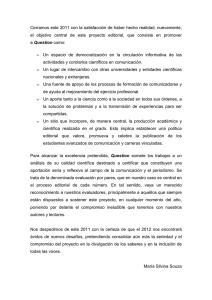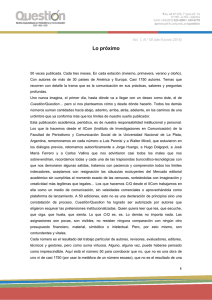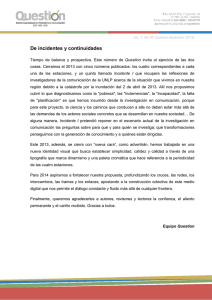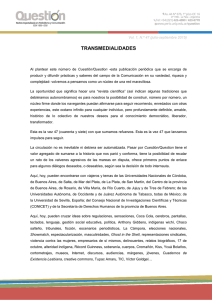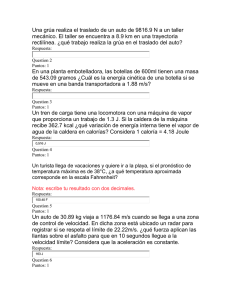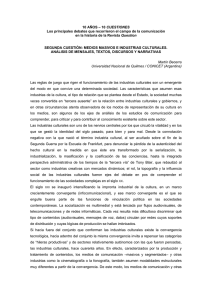Documento 2559024
Anuncio
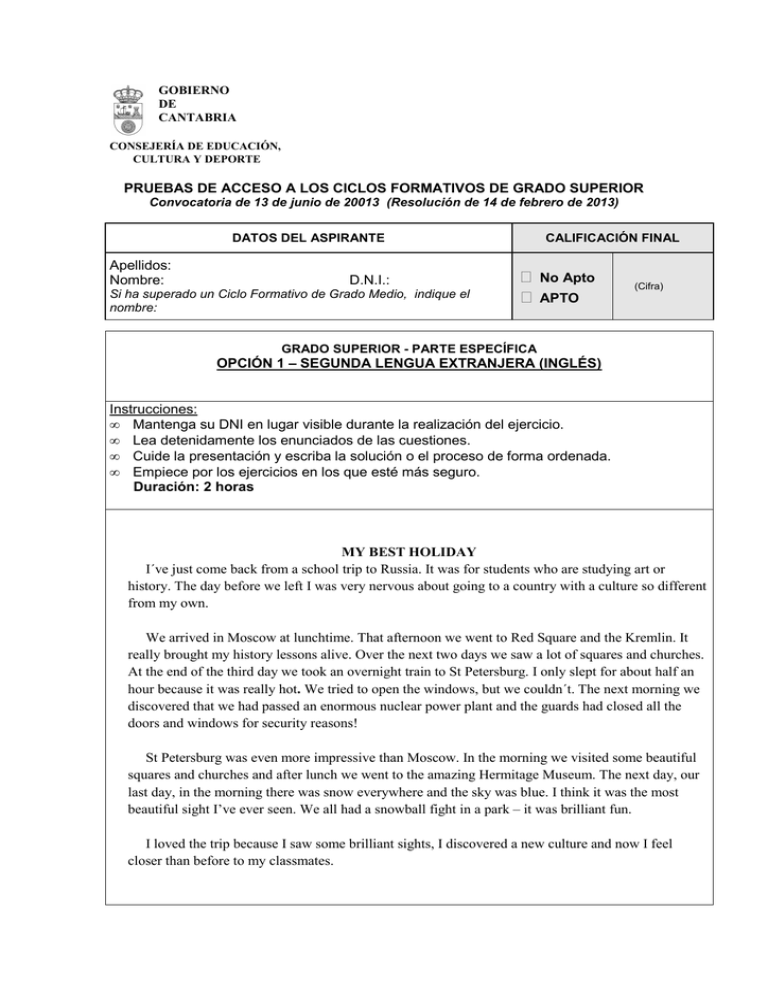
GOBIERNO DE CANTABRIA CONSEJERÍA DE EDUCACIÓN, CULTURA Y DEPORTE PRUEBAS DE ACCESO A LOS CICLOS FORMATIVOS DE GRADO SUPERIOR Convocatoria de 13 de junio de 20013 (Resolución de 14 de febrero de 2013) DATOS DEL ASPIRANTE Apellidos: Nombre: D.N.I.: Si ha superado un Ciclo Formativo de Grado Medio, indique el nombre: CALIFICACIÓN FINAL No Apto (Cifra) APTO GRADO SUPERIOR - PARTE ESPECÍFICA OPCIÓN 1 – SEGUNDA LENGUA EXTRANJERA (INGLÉS) Instrucciones: • Mantenga su DNI en lugar visible durante la realización del ejercicio. • Lea detenidamente los enunciados de las cuestiones. • Cuide la presentación y escriba la solución o el proceso de forma ordenada. • Empiece por los ejercicios en los que esté más seguro. Duración: 2 horas MY BEST HOLIDAY I´ve just come back from a school trip to Russia. It was for students who are studying art or history. The day before we left I was very nervous about going to a country with a culture so different from my own. We arrived in Moscow at lunchtime. That afternoon we went to Red Square and the Kremlin. It really brought my history lessons alive. Over the next two days we saw a lot of squares and churches. At the end of the third day we took an overnight train to St Petersburg. I only slept for about half an hour because it was really hot. We tried to open the windows, but we couldn´t. The next morning we discovered that we had passed an enormous nuclear power plant and the guards had closed all the doors and windows for security reasons! St Petersburg was even more impressive than Moscow. In the morning we visited some beautiful squares and churches and after lunch we went to the amazing Hermitage Museum. The next day, our last day, in the morning there was snow everywhere and the sky was blue. I think it was the most beautiful sight I’ve ever seen. We all had a snowball fight in a park – it was brilliant fun. I loved the trip because I saw some brilliant sights, I discovered a new culture and now I feel closer than before to my classmates. Question 1 (2 points).Indicate if the following statements are true or false and write down which part of the text justifies your answer. 1. History lessons were very useful for the writer in this trip __________________________________________________ 2. Although it was very hot, the author could sleep for hours. __________________________________________________ 3. According to the author St Petersburg isn’t as nice as Moscow ____________________________________________________ 4. The students played a game in the snow _____________________________________________________ Question 2 (2 points).Answer the following questions in your own words. 1. Why was the author nervous the night before the trip to Russia? ____________________________________________________ 2. What did the students do in Moscow? ___________________________________________________ Question 3 (1.5 points) Find the synonyms in the text for the following words. a) Found out (paragraph 2) ____________________ b) Safety (paragraph 2) ____________________ c) Battle (paragraph 3) ____________________ Question 4 (1.5 points) Complete the sentences with the correct structure. 1. All the windows ______________ closed for security reasons all night long (past passive) 2. During the trip I met David, ______________ is now one of my best friends (relative pronoun) 3. If I visited Moscow, I __________________ go to Red Square (conditional sentence) Question 5 (3 points) Write a short essay (about 100 words) on ONE of the following topics: Travelling to a foreign country : advantages and disadvantages Or Using the internet is the best way to organize a trip to a foreign country. 2 SOLUCIONES Question 1 (2 points).Indicate if the following statements are true or false and write down which part of the text justifies your answer. 1. History lessons were very useful for the writer in this trip TRUE “It really brought my history lessons alive.” 2. Although it was very hot, the author could sleep for hours. FALSE “I only slept for about half an hour because it was really hot” 3. According to the author St Petesburg isn’t as nice as Moscow FALSE “St Petesburg was even more beautiful than Moscow” 4. The students played a game in the snow TRUE “We all had a snowball fight in a park” Question 2 (2 points).Answer the following questions in your own words. 1. Why was the author nervous the night before the trip to Russia? He was really nervous because he was going to travel to / visit a country which has got a culture different from his 2. What did the students do in Moscow? They visited/ went to see some interesting places such as Red Square, the Kremlin and many/ lots of squares and churches. Question 3 (1.5 points) Find the synonyms in the text for the following words. a) Found out (paragraph 2) discovered b) Safety (paragraph 2) security c) Battle ( paragraph 3) fight Question 4 (1.5 points) Complete the sentences with the correct structure. 1. All the windows were closed for security reasons all night long (past passive) 2. In the trip I met David, who is now one of my best friends (relative pronoun) 3. If I visited Moscow, I would go to Red Square (conditional sentence) 3 CRITERIOS DE CALIFICACIÓN: Question 1 (2 points) Indicate if these statements are true or false and write down which part of the text justifies your answer. En cada pregunta se valorará cada respuesta correcta de TRUE o FALSE que incluya la parte literal del texto que justifique dicha elección de verdadero o falso. El candidato deberá escribir la palabra completa “TRUE” o “FALSE” (0,25 puntos), para evitar la ambigüedad de la T sobre la F, y justificar su respuesta copiando la información relevante del texto (0,25 puntos). Se justificarán todas las respuestas, sean verdaderas o falsas. Question 2 (2 points) Answer the following questions in your own words. En cada respuesta se valorará con 0,5 puntos la comprensión correcta del texto y con 0,5 puntos la expresión escrita. Se tendrá en cuenta la corrección y adecuación del léxico y de las estructuras gramaticales utilizadas. Se penalizarán los errores gramaticales, de vocabulario y de spelling con 0,1 punto cada error hasta un total de 0.5 puntos de penalización. Para responder a las preguntas, los alumnos se apoyan en la información del texto, pero sin copiar textualmente la respuesta. En el caso de copiar textualmente, solo les valorará 0.5 puntos correspondientes a la comprensión. Question 3 (1.5 points) Find the words in the text that mean the same as the following definitions. Se valorará con 0,5 puntos cada respuesta correcta. No se penalizarán los errores de spelling, ni el añadido de palabras que acompañan a la palabra correcta (cuando añaden el modal o el auxiliar que va delante del verbo que se les pide, o cuando añaden el sustantivo del adjetivo que se les pide) Question 4 (1.5 points) Complete these sentences with the correct structure El candidato tiene que completar las frases con las palabras adecuadas a la estructura que se marca entre paréntesis. Para facilitárselo al candidato se le especifica qué estructura gramatical se le está pidiendo. Se valorará con 0,5 puntos cada respuesta totalmente correcta. En este ejercicio puramente gramatical, se pueden admitir errores de spelling con una penalización de 0.1 por error, pero la frase sería considerada nula si el alumno no fuese capaz de completar correctamente la estructura que se le pide (pasiva, condicionales….en sus tiempos verbales). 4 Question 5 (3 points) Write a short essay (about 100 words) on ONE of the following topics Se otorgará 1.5 puntos a la estructura global de la redacción, teniendo en cuenta la coherencia y la claridad de exposición de las ideas, argumentos y opiniones expresados. Desglose: - 0,5 puntos: estructura del escrito (inicio, desarrollo, conclusión) y número de palabras según lo requerido. - 0,5 puntos: estilo, argumentos y opiniones variados, que no se repita constantemente la misma idea en el escrito. - 0,2 puntos por la utilización de varios y apropiados elementos de cohesión. - 0,2 puntos por la correcta utilización de los signos de puntuación. - 0,1 puntos por la claridad y la limpieza en el escrito. Se otorgará 1.5 puntos a la expresión escrita, para lo cual se tendrá en cuenta la adecuación y corrección de las estructuras gramaticales y del léxico elegidos a partes iguales (0,75 cada parte). Se tendrá en cuenta en este apartado la corrección gramatical y ortográfica. Se penalizarán los errores gramaticales, de vocabulario y de spelling con 0,1 por error. En este ejercicio de expresión escrita, el candidato deberá escribir sobre los temas propuestos. Si no se desarrolla ninguno de los temas propuestos, la calificación será CERO (0). 5
